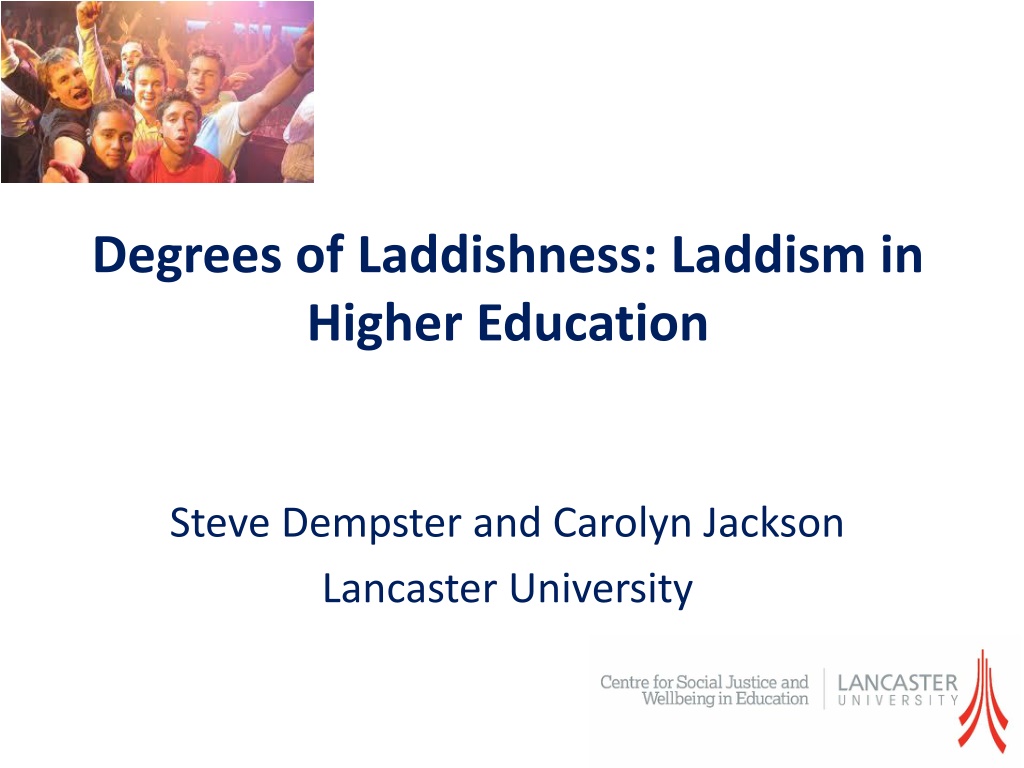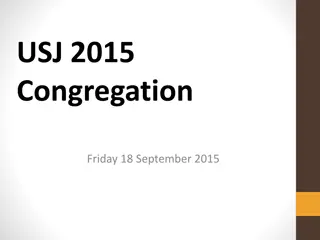Understanding Degrees of Laddishness in Higher Education
Current media reports highlight the pervasive nature of lad culture in higher education, affecting student behavior and academic performance. Studies conducted in 2002-04 and 2011-13 shed light on the perceptions and impact of laddism, revealing aspects such as group identity, social behavior, and views on academic success. The research explores how laddishness manifests in attitudes towards drinking, relationships, and popularity within university settings.
Download Presentation

Please find below an Image/Link to download the presentation.
The content on the website is provided AS IS for your information and personal use only. It may not be sold, licensed, or shared on other websites without obtaining consent from the author. Download presentation by click this link. If you encounter any issues during the download, it is possible that the publisher has removed the file from their server.
E N D
Presentation Transcript
Degrees of Laddishness: Laddism in Higher Education Steve Dempster and Carolyn Jackson Lancaster University
Current media reports Student lad culture has become a national issue. The phenomenon, often associated with the website Unilad, has become a catch-all term for anything from boozy boisterousness to casual misogyny and even sexual abuse. But despite numerous media reports on laddism, universities still have little idea of how widespread its effects are. (Guardian.co.uk, 05/04/13) Lad culture's beery, shouty voice is dominating student life and alienating women (The Observer, 28/4/13)
A decade ago We have to crack the lad culture that stops too many young boys doing well at school. . . . The culture tells boys that it is fine to play around and not work hard. But this harms their chances of doing well, getting their exams and fulfilling their potential. (David Miliband, cited by Clare, 2003: 5) The girls lead over boys at GCSE has been put down to the growth of a laddish anti-learning culture among teenage boys. . . . Educationalists pinpointed a possible cause several years ago in an attitude among teenage boys that it is uncool to be bookish, a swot, or good in class, coining the term laddish anti-learning culture . Liz Heron (2002: 2).
The 2007 Research (Empirical work 2002-04) PhD Study: Steve Dempster (Supervised by Carolyn Jackson & Jo Warin) Site Plateglass collegiate university in England Questionnaires 180 male Undergrads (years 1-3) Individual Interviews with 24 male students (11 non- lads, 8 lads , 5 others ) and 3 members of staff.
The 2011-13 Research (SES funded) Steve Dempster (Lancaster University) and Lucie Pollard (University of Greenwich) Site - one post-1992 university in southern England Questionnaires all sports science students (years 1-3) Observations 6 x 2 hour lectures Interviews - individual interviews with 33 students (11 women and 22 men) and 5 members of staff (2 women and 3 men).
How is laddism perceived? 2002-04 Study 2011-13 Study I wouldn t say violent but sort of stand up for yourself sort of thing; you don t want to be some little weedy thing because then that s not going to be one of the lads, if you re like a little weed. I don t know, handling your drink and sort of a hit with the ladies, obviously if you re sort of well gay, if you re gay, you re not going to be linked to one of the lads There is this laddish culture with drinking and stuff and I think it goes with every university I d say to include sleeping around as well sometimes, I think, and yeah, just, you know, looking to be popular as well. So in a team, like in a sports team or whatever, like say the rugby team or something, you know, and quite a big figure in the team.
Overview of Findings 2002-04 (a) Laddishness = a culturally authoritative template of masculinity in HE; Only 34% in survey self-identified as lads; Interviews reveal complex and shifting relationships with laddishness. 6/8 lads renounced laddishness in interview; 3/11 non-lads bought into laddishness in interview
Findings 2002-04 (b) Laddishness was more influential: During the transition to HE; On boys nights out In male sports teams ( Real / Proper lads) There s something about football that seems to make lads really laddish. They think they re the king of the world if they re in a football team (Mickey, Lad )
Engagements with Laddishness (1) Shifting a temporary front : I don t believe in laddishness... I believe I can shift my identity to that. But I m not doing it to show, I m not doing it to show people; I m doing it because I enjoy a bit of laddishness you know, just the boys sort of thing (Alex Lad ).
Engagements with Laddishness (2) Real lads = the other : I think [lads masculinity] is probably more superficial, perhaps I think that anything that people think has to be portrayed overtly is possibly in question. It s almost like a reaction to an anxiety about it; it s kind of, they re questioning it themselves, and the easiest way to dispel any interrogation of their masculinity is to overtly show it. And I think I m more happy in myself perhaps than I don t feel the need to, you, know be part of that (John- Lad ).
A continuum of laddishness? Academic Social https://encrypted-tbn2.gstatic.com/images?q=tbn:ANd9GcRpjJakwgodVuKkFbPD-wpm-M95E9TERZ7jCMdWsR5NKhxThZB3hw Proper Lad Boring / geeky/ lightweight Benefits vs. Negatives of laddishness; Shift between the two poles through balancing academic and social = ordinary Practise laddishness by degree.
Laddish behaviours in teaching-learning contexts There s a big group of them [lads]; they turn up about twenty minutes late and I ve complained about them a few times I sit like right at the front [of the lecture theatre], so for me to be able to hear them like it s affecting my learning ... I ve had to ask for extra help when I shouldn t have [had to] because I would have understood it if they weren t talking, so that s annoying. But that s just boys isn t it! but they just don t seem to really care, they just think it s cool to sit there and talk. Like the worst is a Monday morning because they ll talk about football and you don t really want to hear about football when you re in an anatomy class. (Paris, Y1 Sports Science)
Mia (Y2, sports science) And does it actually disrupt the teaching sometimes, do you think? Yeah, it does, yeah, big time I can hear them laughing and joking behind me, and that alone, that just stops whoever s teaching to tell them to be quiet. Or if they catch them throwing something at one of their friends then that stops the class as well, and it s just little things like that that they do. Or even, some of them will make stupid noises, just silly noises that their friends will find funny - nobody else does - and that, again, would stop the class. Does that tend to be blokes, are women involved? It s the guys. No, the women, there s only some girls that will be there and you ll hear them laugh, but they re not, there s no girls on our course that act like the boys where they ll start throwing things and being really destructive.
Oh yeah, well we always banter between ourselves. I mean yeah definitely, like everyone banters I think, especially when there's a lot of lads together. And then, I don't know, a little bit with the lecturers. But it never oversteps or anything, I wouldn't say, it's just a bit of fun, you know, without it like lectures would be boring. (laughs) (Lewis, Y2, Sports Science).
So, do you consider yourself to be a bit of a lad? Yeah. I take part in a lot of sports and enjoy it, see a lot of games, go to the gym. So would you think that there s a lot of laddish behaviour in class at your university? Yeah, sometimes. What sort of things happen? Erm, usually the main one s when one of the lecturers come in, he s quite funny, and he talks about, he talks about mostly sexual things, he s quite funny. So, yeah, he was having a bit of a laugh while he s teaching as well. Alright, so it s not just the students who can be a bit of a lad, it s also the lecturer? Yeah. Alright then. So, you ve said there s a fair bit of laddishness in class? Right. Does that disturb other people, do you think is that a problem, do you perceive, in class or? I don t think so because the majority of people in our class are male. (Patrick, Y1a, Sports Science).
Challenging Laddism With that group of boys sort of like being rude or maybe being noisy, would that affect your learning do you think, in the class? Yeah, it does, it does, it does when you re trying to listen to a lecturer explaining to you something you don t know, you re learning something new and you ve got people in the background making noise, disrupting the class, you know. It does interrupt with your learning and it interrupts with listening, especially if you don t get something because someone s been making noise in the background and then you have to keep asking the lecturer oh can you repeat yourself . a couple of times I had to say, and a couple of my other classmates had to say, you know, quieten down, I m here to learn, I pay my fees to come here, if you don t want to learn come out of the class . (Saisha, Y1 sports science)
Challenging Laddism Do you think the laddish behaviour affects other people s learning? Sometimes, coz I know some students that sit at the back can get quite loud while lecturers are talking, so I know some of the girls at the front always have a go at them for talking too loud, or for talking at all during a lecture. So students at the back are talking during the lecture? Yeah. Right. And is it just a few people who find that a nuisance, or would you say most people? I d say it was most people, but it s only those couple of girls at the front that actually have the courage to speak up and actually tell them to be quiet. (Hazel, Y1, Sports Science)
Challenging Laddism one student a couple years ago, she was great, a very strong lass, who stood up, turned round and said, Will you shut the fuck up, I m trying to learn . And they did peer pressure gets them a lot more coz suddenly they re made to look fools by a girl, and actually, they didn t like that. (John, Lecturer)
From year 1 to year 2 you see the biggest drop, where you lose all the students that either are not really cut out for the university life or don t really have the drive to carry on to university. And I guess that s the thing with year 1, it weeds out the people that are not really that focused and want to go on to year 2, and I guess year 2 to year 3 s pretty much the same as well. (Ryan, Y3, sports science)
Are lad cultures a problem in Higher Education? Exploring the perspectives and responses of HEI staff To explore and analyse if and how lad culture is manifest in different H.E. contexts (we will explore differences within and between universities); To explore and analyse if, how, and for whom the manifestations are problematic; To investigate what, if anything, universities are doing to tackle lad cultures; To consider whether universities could and should do more to tackle lad cultures, and how they might do this.
Degrees of Laddishness: Laddism in Higher Education Steve Dempster and Carolyn Jackson Lancaster University























